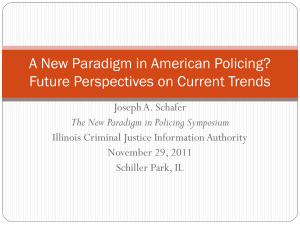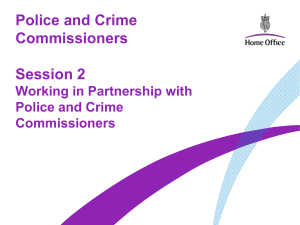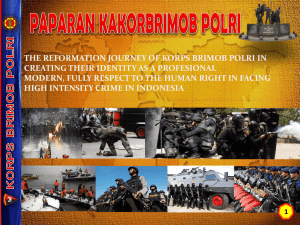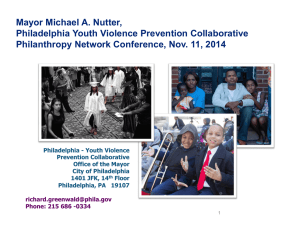Ipsos Reid new PPT template
advertisement
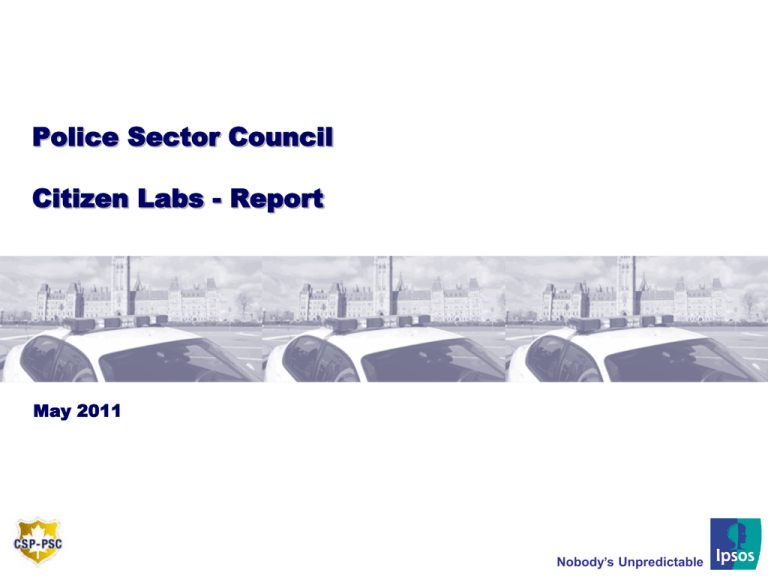
Police Sector Council Citizen Labs - Report May 2011 Nobody’s Unpredictable Table of Contents Background & Purpose 3 Methodology 4 Demographics 5 Executive Summary 7 Detailed Findings 11 Appendix 28 2 © 2011 Ipsos Police Sector Council Background & Purpose Although much effort has been put into better understanding Canadian youth views as they relate to policing, the PSC identified a need to gather qualitative feedback on views and perceptions of the profession. Indeed achieving a better understanding of the various factors which influence key audiences (youth, influencers, members of the general public) views of the police in general and policing as a profession more specifically will serve two key purposes. To provide the much needed context in order to better interpret quantitative results gathered to date and, To allow for a better understanding of the factors and variables which guide members of key audiences when considering the benefits and drawbacks of policing as a profession. At the end of the day, qualitative research findings are meant to inform an eventual PSC social marketing campaign intended to raise awareness of the profession and ultimately support recruitment efforts. 3 © 2011 Ipsos Police Sector Council Methodology Given the nature of the objectives for the research, the Ipsos CitizensLab Quali-Quant research approach was used in two key markets, Toronto, Ontario and Edmonton, Alberta. More specifically: Quantitative – A sample of respondents were recruited to a central location and used wireless TouchPad technology to respond to questions before and after the recruitment presentation for approximately 60 minutes. Clients watched, in real time, the responses to the closed-ended questions on a TV screen Qualitative – A smaller group of 6-8 participants was selected to stay behind after the quantitative session for approximately 90 minutes to discuss their opinions on policing as a career in more detail. Two youth groups were conducted and one group with key influencers (teachers, coaches, parents, etc.) Total sample acquired in each market is as follows: Toronto: n=37 Edmonton: n=38 The scales throughout this report are subject to the most intuitive depiction of both the data from a quantitative perspective and the story from a qualitative perspective It’s important to note that the presentations in Toronto and Edmonton were done by different police officers and were different in content and nature. This difference in content and tone may explain differences in terms of pre-post results. © 2011 Ipsos Police Sector Council 4 Reading this Report The analysis of qualitative findings yields tendencies and indications of how the target audience perceives the study issues. However, qualitative research results are not representative of the general population. This research involved a limited number of individuals who were specifically selected according to pre-determined attributes. Qualitative data are reviewed with a view to drawing out continuities and synthesizing the main themes, critical “hot buttons”, “typical” responses and general levels of agreement/disagreement voiced during the sessions. 5 © 2011 Ipsos Police Sector Council Basic Demographics Question % % TOR EDM Male 51% 50% Female 49% 50% % % TOR EDM 18 – 25 years 35% 29% 25 – 34 years 41% 45% 35 – 44 years 11% 13% 45 – 54 years 5% 8% 55 – 65 years 8% 5% - - Gender Question Age 66 or more 6 © 2011 Ipsos Police Sector Council Basic Demographics Question % % TOR EDM Yes 22% 37% No 78% 63% % % TOR EDM Yes ‘Aboriginal person’ 5% 13% No 95% 87% % % TOR EDM Less than High School 5% 0% High School or equivalency 14% 18% Some college, technical training, trade school 14% 18% Completed college, technical school, trade school 16% 8% Some University 11% 13% Completed University 41% 42% Visible Minority Status Question Aboriginal Status Question Education 7 © 2011 Ipsos Police Sector Council Executive Summary Nobody’s Unpredictable Executive Summary Five key characteristics for an ideal job or career rose to the top for all participants – being passionate about ones work, having the work be mentally or physically challenging, having job security, having a reasonable pay, and having generous benefits. While each of these characteristics was important, passion and challenge resonated more with the youth segments while security, benefits and pay held stronger for the influencers. Generally speaking, respondents believed that police play a positive role in society and their individual communities. However, some negative associations did exist, specifically generated from negative run-ins with the police, public scrutiny of police abuse of power (i.e. G20 in Toronto), and inaccurate portrayals of the police in popular culture. Quantitatively, 79% (Toronto) and 76% (Edmonton) of participants expressed some interest in pursing policing as a career. Qualitatively, participants also showed interest but demonstrated significant knowledge gaps about the key offerings of a career in policing. In addition, participants often saw little overlap between how they perceive a typical police officer and how they see themselves personally. 9 © 2011 Ipsos Police Sector Council Executive Summary After the presentation in Toronto, perceptions of policing as a career were eased with more participants stating that they would encourage others or feel encouraged themselves to follow a career in policing. The presentation also helped bolster confidence perceptions as to the possibilities for advancement and the varied nature of policing work. In Edmonton however, the numbers remained relatively static for these same metrics. Participants were able to delineate the obvious benefits from the drawbacks of a career in policing, however the unique and lucrative offer of becoming a police officer was not completely clear to participants. Participants recognized that a career in policing is like no other, but why? Though there were several benefits which arose in brainstorming, Toronto and Edmonton session findings suggest that the connection between these factors and policing as a potential career have not been clearly engrained in the minds’ of potential recruits or influencers. 10 © 2011 Ipsos Police Sector Council Executive Summary The most distinctive and compelling features of a career in policing appear to be pay, the varied nature of the job, the stability of the job, and the opportunity to pursue further education. Though pay was perceived as a benefit, participants came into the sessions with little idea of what a starting salary for a police officer would be. Other significant knowledge gaps exist (such as the day-to-day responsibilities of being an officer) which are clear barriers to interest in the career. Clarifying these key areas would help further entice potential recruits. In addition to educating potential recruits about the benefits of a career in policing, an image shift is necessary in order to entice a wider net of youth. Youth have a very specific image of who a police officer is and unfortunately this firm image often does not correspond with how they see themselves. Until youth are more able to see themselves reflected in this image, highlighting the various benefits mentioned previously will likely not be sufficient to attract them to this career. Facilitating positive interactions between youth and a variety of police officers (in terms of ethnicity, gender, nature of work etc…) throughout their adolescence appears to be the key to deconstructing this stereotypical image. Allowing youth to see officers in a more human capacity will help bridge this gap. 11 © 2011 Ipsos Police Sector Council Detailed Findings Nobody’s Unpredictable Job & Career Question % % TOR EDM Self-employed 8% - Employed full-time 54% 71% Employed part-time 19% 13% Unemployed 8% 5% Student 5% 5% Retired 3% 3% Other 3% 3% Question % % Which of the following best describes where you are in terms of a career? TOR EDM I have a career or a clear idea of what I want for one 30% 45% I have an idea for a career, but it might change 41% 37% I only have a general idea of what I’d like to do 11% 8% I’m still in the process of figuring this out 11% 11% Not sure 8% - Which of the following categories best describes your current employment status? Despite most participants having full time jobs, many are still relatively uncertain about a definite career path. 13 © 2011 Ipsos Police Sector Council Job & Career Qualitatively, having a good salary, generous benefits, and challenging work came to the forefront as primary characteristics of an ideal job from both the youth groups and the influencers. Of note: In Edmonton specifically, work-life balance and having good co-workers were also deemed important characteristics. 14 © 2011 Ipsos Police Sector Council Job & Career A wide variety of career options were cited as desirable by the various groups, from culinary arts, to piloting, to the tech industry. Unaided, few mentioned policing as something they considered as a career path. The key factors which attracted participants to certain careers were consistent – passion, challenge, security, pay, and benefits. Though youth and influencers both mentioned each of these factors, emphasis varied by segment. Security Passion “I originally wanted to get into philosophy, but now I am in theater and acrobatic arts. I love it because it’s linked to philosophy, looking at the different masks and roles that people play. It’s my real passion.” – youth, Edmonton “You’ve got to do something that’s going to last you your life, to obtain the family or whatever you want in life. It takes a good job to do that.” –influencer, Toronto 15 © 2011 Ipsos Police Sector Council Perception of Police Question Completely Agree (Top Box) Pre Post TOR Pre Post EDM I think police play a positive role in society 35% 32% 27% 32% I think Police play a positive role in my community 22% 22% 18% 16% I think Police should be more active in my community 16% 14% 21% 16% Though Top Box scores stayed relatively static, with many respondents firmly believing that police play a positive role in their community and society generally, there was positive movement which flowed from those who ‘somewhat agree’ and ‘somewhat disagree’ to ‘strongly agree’ after seeing the presentation in both Toronto and Edmonton. 16 © 2011 Ipsos Police Sector Council Perception of Police Law Enforcement Respect Justice Police Brutality G20 Harassment Protection Service Community Dictatorship Crime Pressure Power Quality of Life Power Action Challenging Paperwork Brotherhood Death Donuts Challenging During the groups sessions in both markets, negative and positive top of mind associations arose regarding police. The balance that they bring to society was the primary positive while abuse of power was seen as the main negative. 17 © 2011 Ipsos Police Sector Council Perception of Police Participants across the board had both positive and negative experiences with the police. Youth in particular cited various negative experiences of being targeted specifically those from high crime neighbourhoods. Though these negative experiences certainly impacted their overall perception of policing, participants still recognized that police largely play a positive role and that there will always be some ‘bad seeds’. Another large influence on the perception of police was popular culture, specifically television and movies. The context within which participants view policing is heavily impacted by the stereotypes that are portrayed on shows like CSI Miami, or movies like The Departed. These stereotypes also had a strong influence on how participants see the day-to-day functions of a policing job. “It would be really cool to be a forensics nurse, it’s like those people on CSI who investigate the scene and try to help innocent people.” – youth, Edmonton “On TV you see Good Cop and Bad Cop, whether it’s reality or not. A lot of kids are just looking at that.” – influencer, Toronto 18 © 2011 Ipsos Police Sector Council Policing as a Career: Interest Question % % Which of the following best describes the extent to which you or your children have considered a career in policing? TOR EDM Never really thought about it 22% 24% Considered it, but haven’t done more than think about it 38% 37% Looked into it informally (i.e. talked to a family, friends) 14% 18% Looked into it more thoroughly, but never contacted anyone in policing directly 16% 8% Contacted a police representative to discuss a career in policing 11% 13% 79% and 76% of participants, in Toronto and Edmonton respectively, have considered policing as a career in some capacity. 19 © 2011 Ipsos Police Sector Council Policing as a Career: Perceptions Question Completely Agree (Top Box) Pre Post Pre TOR Post EDM My family and friends would encourage me to become a police officer if it was of interest to me 19% 27% 34% 32% I would encourage people I know to consider a career in policing 19% 30% 18% 16% Policing is more than a job, it’s a profession 57% 54% 50% 53% I am confident that I have / my children have what it takes to become a police officer 16% 24% 24% 18% Policing is a dangerous career choice 32% 24% 8% 18% The presentation helped to ease some concerns about policing being a dangerous career choice in Toronto, while in Edmonton the opposite was true. In Toronto, the recruitment presentation helped to bolster participant confidence in policing as a career choice with more feeling they would encourage others to become police officers or would expect more encouragement if they themselves pursued that path. Confidence in ability to successfully become a police officer also rose after the presentation in Toronto. In Edmonton however, most numbers remained static while some even dipped. The nature of the presentation given in Edmonton was quite different both in tone and content, often reinforcing stereotypes of policing being difficult and dangerous. It is likely that this difference had an impact on post presentation scores. 20 © 2011 Ipsos Police Sector Council Policing as a Career: Perceptions Question Pre Being a police officer means you’re not allowed to think on your own. Post Pre TOR Post EDM Completely Agree - - - - Strongly Agree - 3% - - Somewhat Agree 16% 14% 3% 8% Somewhat Disagree 30% 16% 16% 8% Strongly Disagree 32% 35% 42% 45% Completely Disagree 22% 32% 40% 40% Question Pre Post Pre Post Working as a police office is no different than any other job. Completely Agree TOR EDM - - 3% 3% 8% - - 3% - 8% 5% 8% Somewhat Disagree 16% 24% 16% 13% Strongly Disagree 46% 24% 26% 24% Completely Disagree 30% 43% 50% 50% Strongly Agree Somewhat Agree Respondents did not feel that being a police officer restricted freedom of thought and the presentation simply reinforced this sentiment. There was a strong sense that being a police officer is in fact quite different than other jobs, both before and after the presentation. The focus groups revealed that this was largely driven by the grave risk of injury or death. 21 © 2011 Ipsos Police Sector Council Policing as a Career: Perceptions Question Pre Completely Agree (Top Box) Post Pre TOR Post EDM Getting hired as a police officer is a long and difficult process 32% 19% 11% 5% I’m not sure there are many jobs available in policing these days 8% 3% 3% 3% There are a wide variety of career options within policing 19% 54% 29% 29% A career in policing comes with good pay and benefits 16% 32% 8% 40% It’s hard for police officers to balance a career in policing and family life 5% 5% 3% 21% Question Pre Post Pre Post There are limited opportunities for career advancement in policing. TOR EDM Completely Agree - 3% 3% - Strongly Agree - 5% 3% - Somewhat Agree 32% 11% 21% 21% Somewhat Disagree 41% 16% 26% 16% Strongly Disagree 24% 49% 40% 37% Completely Disagree 3% 16% 8% 26% The presentation helped encourage respondent confidence in the availability of variety within the field, opportunities for advancement, and specifically the generous pay and benefits. In Edmonton however, the nature of the presentation once again reinforced some negative stereotypes about policing, namely the lack of work-life balance. 22 © 2011 Ipsos Police Sector Council Policing as a Career: Intent Question Pre Which of the following best describes how you think about yourself as a police officer? Post Pre TOR Post EDM I can’t picture myself as a police officer, period! 14% 11% 24% 16% I might consider becoming a police officer if my other options were limited, but I’m not really the type. 43% 46% 32% 42% I can picture myself working as a police officer. 43% 43% 45% 42% Not much movement was seen in intent to become a police officer before and after the presentations in both Toronto and Edmonton. Qualitatively (as outlined in the following slides), it appeared that before seriously pursuing policing as a career, participants needed to have the advantages of this path crystallized in their minds. 23 © 2011 Ipsos Police Sector Council Policing as a Career: Benefits & Drawbacks Benefits • Respected job • Help serve the community • Generous benefits • Emotionally rewarding/sense of accomplishment • Job security • Encourages physical fitness • Job advancement • Variety of work Drawbacks • Physical danger/death/serious injury • Emotionally stressful • Daily uncertainty (lack of routine) • Public scrutiny • Shift work/lack of work-life balance • Fear of corruption “Job security and benefits are definitely the benefits of a career with the police. You can feel stable.” – influencer, Toronto “The emotional attachment must be hard. So much exposure to trauma.” – influencer, Toronto “As a cop there is a certain social status, people in the community respect you.” – youth, Edmonton “Obviously death or serious injury are the main problems. If something happens you can’t even do your job anymore.” – youth, Toronto 24 © 2011 Ipsos Police Sector Council Policing as a Career: Hiring Process You will not get hired as a police officer if you… Have a criminal record. Are not physically fit. Don’t have a postsecondary education. Participants in both markets had a vague notion that becoming a police officer would be an arduous process, however for the most part were generally unaware of what exactly it entails and what experience or qualifications are required. Making the process and credentials more transparent and straightforward would greatly help potential recruits understand exactly what must be invested to pursue this career path. 25 © 2011 Ipsos Police Sector Council Policing as a Career: New Information & Knowledge Gaps Some key knowledge gaps arose, particularly around the salary/pay of a police officer and the implied variety that the job offers. Educational compensation/support was one valued offering that participants did not previously know about and was viewed as a selling point much like the military. Ultimately, the unique and lucrative offer of becoming a police officer was not completely clear to participants in either Toronto or Edmonton. Though there were several benefits which arose in brainstorming, the connection between these factors and policing as a potential career have not been clearly engrained in the minds’ of potential recruits or influencers. Pay, the varied nature of the job, and the opportunity to pursue further education appeared to be valued selling features which should likely be emphasized going forward. 26 © 2011 Ipsos Police Sector Council Policing as a Career: Image Robotic Rigid Physically Authoritative Male Caucasian Unapproachable “The image I see is 5"11, tall, white, built guys, and I think I have to be that guy if I want to be a police officer.” – youth, Edmonton Participants, specifically youth, noted that their lack of interest in policing as a career is rooted in the stereotype of police that has been portrayed to them throughout their lives. Since they simply don’t see themselves in this image, when it comes time to choose a career path, they dismiss policing as “not for them”. Even the key selling points of a career in policing (i.e. pay/benefits, stability, etc.) are null if potential recruits don’t see themselves in the job. Youth suggested facilitating positive interactions between police and youth at key ages (14 – 17) would greatly help to shift the stereotypical image of police. 27 © 2011 Ipsos Police Sector Council For more information: Marc Beaudoin Vice President, Qualitative Hothouse Ipsos Reid Public Affairs marc.beaudoin@ipsos.com Brad Griffin Vice President, Qualitative Hothouse Ipsos Reid Public Affairs brad.griffin@ipsos.com Kanan Kothari Senior Research Manager, Qualitative Hothouse Ipsos Reid Public Affairs kanan.kothari@ipsos.com © 2011 Ipsos Police Sector Council 28 Appendix Nobody’s Unpredictable Appendix: Employment Information Question % % Which of the following sources would you be most likely to rely on when looking for job information? TOR EDM Advertisements and job postings on employer websites 35% 61% Advertisements and job postings in print media (magazines, newspapers etc) 19% 13% In person at potential employer offices 16% 3% Advertisements and job postings on media websites 14% 18% Advertisement on Television 3% - Advertisements on Social media sites 3% 3% In person at the local employment office 3% 3% - - 8% - Advertisements on the Radio Other 30 © 2011 Ipsos Police Sector Council

